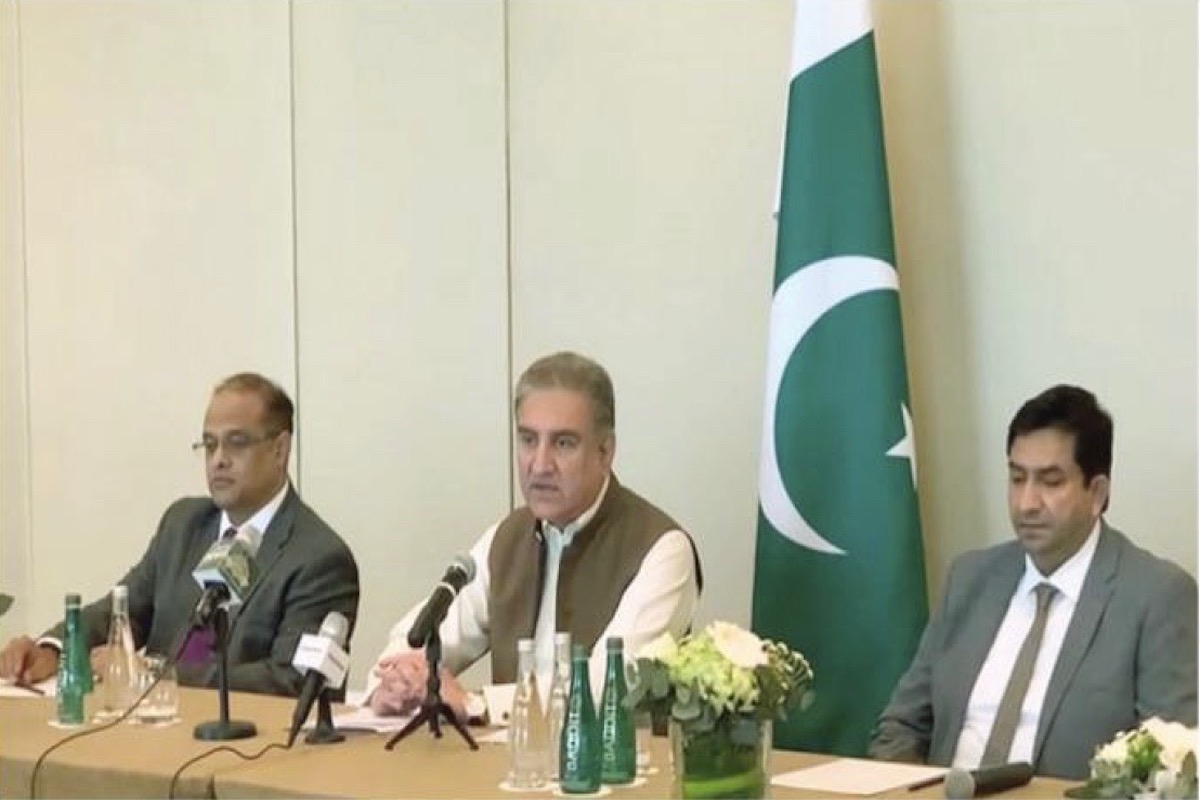Shah Mehmood Qureshi, Pakistan’s foreign minister, addressing a press conference in Abu Dhabi, stated: “An important development has cropped up. I have learned through our intelligence forces that India is planning a surgical strike against Pakistan. This is a serious development and I also have knowledge that they tried to seek approval from important players who they consider to be their partners.” He again attempted to bring up the globally rejected dossier by stating that Pakistan had revealed ‘India (was) sponsoring terrorism in Pakistan’ through a dossier that it had shared with the international community. These comments were later repeated by Imran Khan.
The question which remains unanswered is why Abu Dhabi was chosen for the announcement. Was it because Qureshi’s visit to UAE failed as it refused to lift the ban on Pakistan workers as also that it was unwilling to support Pakistan financially? UAE officials stated two days later that the ban was temporary but did not mention when it would be lifted.
Advertisement
Around the same time, in an interview to ‘The Christian Science Monitor’, Pakistan’s ambassador to the US, Majeed Khan, stated Islamabad wants the US to help stop Indian interference in Pakistan’s internal affairs. He added, “we do not want our relationship with Washington to be India-specific,” hinting that the US must recognize efforts of Pakistan in promoting peace in Afghanistan. He also raised the issue of the “dossier” raised by Pakistan on Indian interference in its internal matters. He said: “(India) is trying to destabilise Pakistan’s economic cooperation with China by fomenting terrorist attacks against Chinese-financed development projects, including a deadly assault at a luxury hotel in Gwadar.”
In the same interview, James Dobbins, a former US special representative for Pakistan and Afghanistan projected the US view, stating, “We may see the US taking a little tougher stance toward India over its human rights record, but basically we’ll continue to court India as a counterweight to China,” adding, “and overall, I don’t think we’ll see the Biden administration taking a very different approach to Pakistan than the Trump administration did.” This would suggest Pakistan’s attempts to paint India as a villain are failing.
In another incident last weekend, Pakistan accused India of targeting a UN Military Observer vehicle. This was denied by India as it had prior information of the visit and there was no firing in the area. Pakistan stated that India “specifically targeted a UN vehicle carrying members of the United Nations Military Observer Group in India and Pakistan from across the Line of Control.” It added, “Such illegal and unlawful acts against all established international norms, signify malintent of Indian Army to target not only innocent civilians residing along the LoC but UN Peacekeepers as well.”
Pakistan’s Foreign Office spokesperson, Zahid Chaudhri, stated, “Pakistan urges the international community to advise India against any irresponsible act and to desist from any action that would jeopardise regional peace and stability.”
The UN representative in New York stated, “At this stage, we’re simply aware that a vehicle was hit by an unidentified object, no one was harmed, we are investigating the incident.” This is not the first time that Pakistan has accused India of targeting UN Peacekeeping vehicles. It had done so in 2017 and 2018. In both cases the UN itself dismissed Pakistan’s claims on grounds that the incident had occurred but there was no proof that it was due to Indian firing.
These three announcements were near simultaneous and in not a single case did Pakistan present any concrete evidence to back up its claims, other than repeating the story of its dossier which anyway contains no proof.
Why has Pakistan suddenly begun spreading propaganda against India? Internally, the government is facing intense pressure from a combined opposition and a rising Pashtun movement. Accusations on the army, for interfering in internal politics and corruption, continue to grow, with former Premier Nawaz Sharif leading the attack. To add to this are growing cases of Covid, a failing medical system and an economy in ruins. The only way to offset the opposition, deflect growing internal pressure and back the army is by claiming that India is planning a surgical strike. After all, India is the eternal enemy. To add credence to these claims, the army is supposedly placed on high alert.
The smooth conduct of District Development Council elections in J and K, with no calls for boycott nor incidents of terrorist violence, and active participation by locals, displays a failure of Pakistan’s Kashmir policy. There has been no support to the country even in the Organization of Islamic Cooperation (OIC). The officially released OIC statement on Kashmir, after the foreign ministers’ meeting in November, was in sharp contrast to what was claimed by Pakistan.
Diplomatic and economic pressure is mounting on Pakistan on account of its support to terrorist groups. Its known allies have backed away and are unwilling to support the country. It is being compelled to borrow from China at much higher rates of interest to repay loans from Middle East nations. Oil on deferred payment basis has stopped, adding to economic woes.
It is also hoping to enhance pressure on India as Indian retaliation along the LoC is causing havoc on its defences. Further, Indian exposure of Pakistan’s involvement in backing terrorism has been increasing. Pakistan has been attempting to sell its fake dossier in every country, hoping that someone may join it in support. This could then enable Pakistan to justify its actions in Kashmir and enable it to get out of the FATF blacklist by accusing India. Thus far, apart from China and Turkey, not a single nation has stood by Pakistan.
Pakistan will continue inventing new charges against India, all without proof, in the desperate hope of offsetting internal mounting pressure on the establishment. Globally, it will continue crying foul, hoping that at some stage it receives support as the weaker neighbour of India.
The writer is a retired Major-General of the Indian Army.











